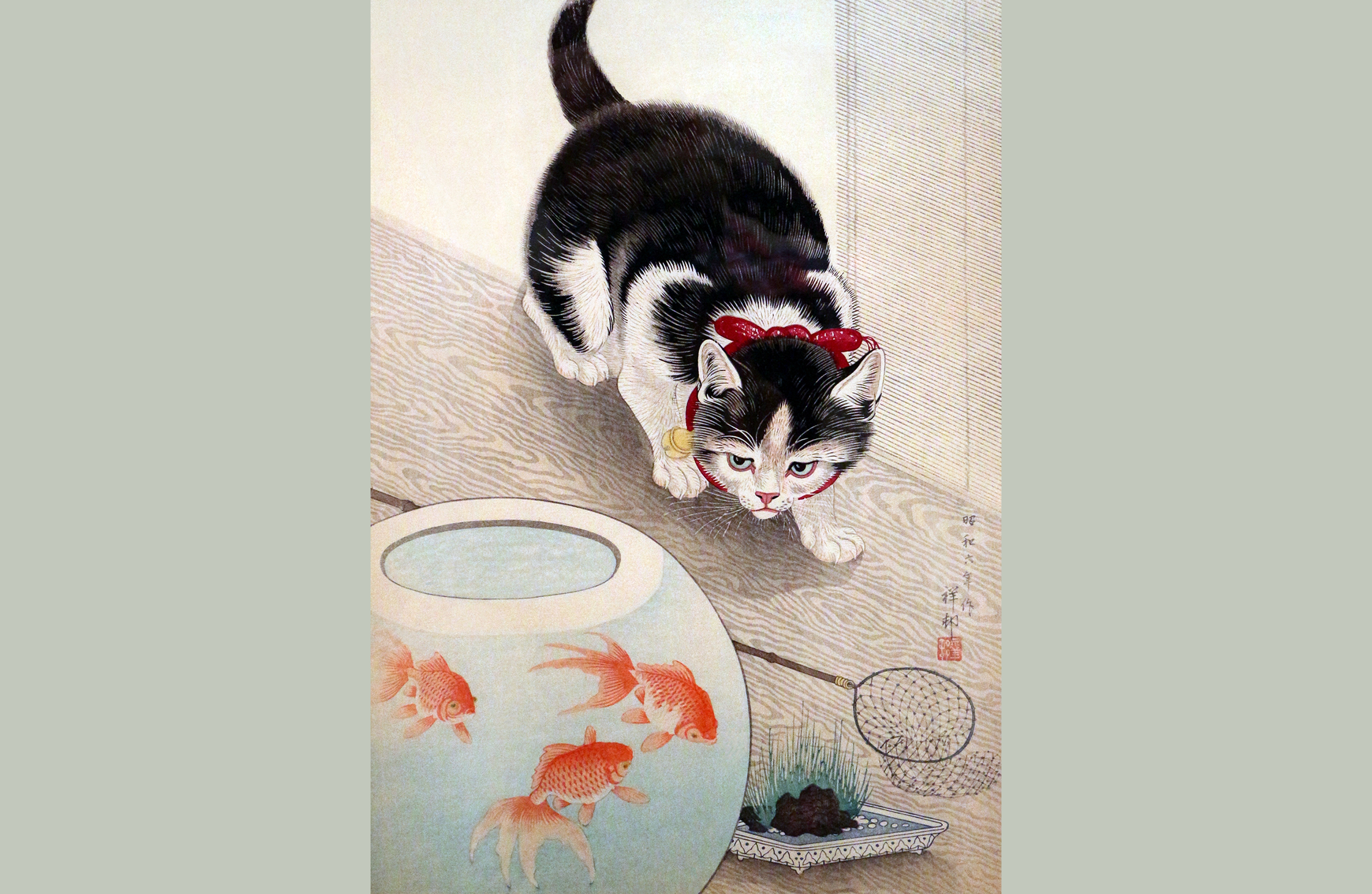Cat and goldfish bowl / Ohara Koson (1933)
Narrated by James Cheatham
Don’t you love it when a player shows up to the first play session with five pages of notes stapled to their character sheet containing every life’s breath of their character? How about when the whole table does? In the same way that running RPGs isn’t about writing a book to have characters go through your plot, running a character isn’t about extending non-collaborative backstory into the game.
It isn’t the player’s fault for wanting to do this. Oftentimes, they’ve been educated to do exactly that, believing it to be helpful. There are some cases when it can be helpful, but more often than not, a GM is only going to be able to incorporate a fraction of backstory into their game, because having to integrate so many disparate threads into an ongoing game is a logistical nightmare.
So, in order to avoid an overwhelming amount of backstory (that will likely not come up much anyway), I’ve opted to change how backstory works in my games. All Player Characters (PCs) should have no more than a couple of bullet points that depict vague highlights from a character’s past. It might look like saying that your character:
- Grew up penniless on the streets of Bigmaintown.
- Has a cat that they love more than anything else.
It isn’t very meaty, but it paints a perspective, and gives me, as a GM, the chance to ask questions about what happened in the character’s life before the game started. More importantly, it gives other players at the table the chance to ask the character questions, as well. As part of session zero or session one (whenever characters are created for your group), collaborating on these backstories integrates them into the fabric of the game organically. Players will find opportunities to connect their character’s past to other characters’ pasts; and rather than having to sit and read and try to incorporate everyone’s backstories yourself, the table does the work for you.
But what then? Once the game gets started, it makes sense that a character’s history has an impact on their present. If, as GMs, we’re not writing plot hooks based on backstory, we need a method utilizing a character’s history in a way that immediately applies to the present plot. There are two ways I do this: PCs can use backstory as a currency, and GMs can use backstory as something to tap into as a reaction (NOTE: in the games I run, I don't roll dice; I'm only allowed to react to what the players do, and how they roll.)
Backstory as currency
As a currency, all PCs have one point of Backstory that they can spend at any time they feel it would make sense for their character to have some trick up their sleeve, or bit of knowledge that I haven’t given them directly, based on their backstory. For instance, say our character above was running from city guards through the streets of Bigmaintown. Since, from their history, they grew up on these streets and know them extensively, they could spend their point of Backstory to know exactly where a hiding place could be found, or where a city-guard-despising gang concentrates activity at that part of the day.
I’d probably ask when the last time they used this hiding place was, or how they knew about the gang activity, but these questions aren’t about challenging the player. Whatever the player says is correct and canon; and it gives me a whole lot of pertinent information to work with immediately and call back on in the future if I need it. The player will get a point of Backstory back when they level, or when they hit some other milestone.
Backstory as an element for reactions
As an element, I can tap into a PCs backstory as a reaction. This lets me use their backstory on my own terms to weave dice rolls and PC choices into the story. If the character is sneaking around and fails a Stealth roll, I might have their beloved cat begin mewling at the least opportune time. If they succeed, I might have the cat knock something very expensive and loud off a mantle away from the character, providing them with a distraction. While the cat’s actions aren’t explicitly from the character themselves, they are implicitly bound to the agency the character has on the story.
Ultimately, the reason for all of this is that a character’s backstory should only exist for the purposes of the present. Everything should progress plot, and backstory is no different. If you think of how backstory is introduced effectively in novels or movies, it’s always presented in the context of what’s happening right now, and then, only when what happened back then has relevance. Everything else is just white noise that should be edited out. Using backstory in this way frees up player and GM time, and provides a far faster and more secure route to player buy-in.
Brendan Quinn is the President of Tri-City Area Gaming, a 501(c)(3) nonprofit that promotes critical thinking skills with community-building events and supports game-based educational and charitable activities. He is an ASWB certified Therapeutic Game Master with over 20 years of GM experience.
Tri-City Area Gaming uses tabletop gaming as a framework for social interaction, education, and community building. They host nearly 100 events a year in order to bring folks together in a way that’s safe, friendly, and inclusive.
Check out Tri-City Area Gaming’s events and follow them on social media: tcag.carrd.co


